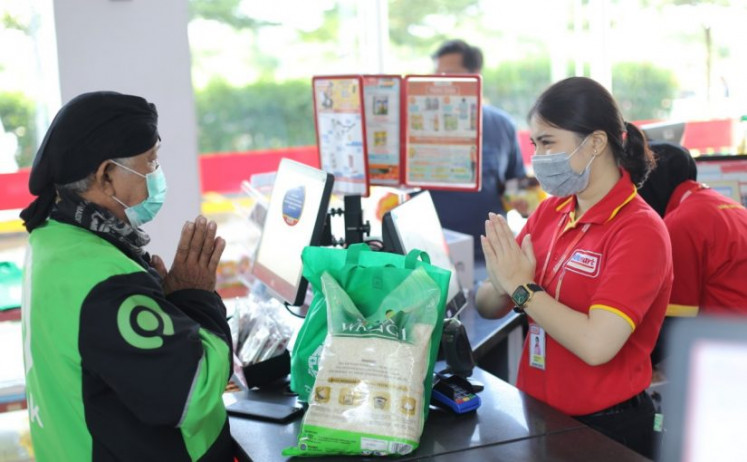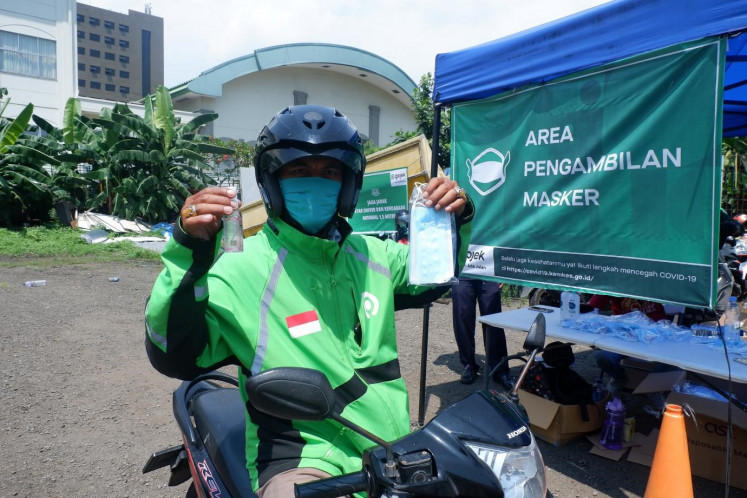
The COVID-19 pandemic that has affected Indonesia for the past three months has not eroded the spirit of gotong royong (mutual cooperation) in the start-up sector and the digital economy ecosystem, a new study has found.
Lembaga Demografi of the School of Economics and Business at the University of Indonesia (LD FEB UI) has just released the results of its survey of 41,393 driver partners of Indonesian superapp Gojek to understand how they cope with the impacts of the coronavirus outbreak.
The survey revealed that amid the difficulties, Gojek’s driver partners are supported by close cooperation among the Gojek company management, their fellow driver partners and customers who lend mutual support to each other.
According to the survey, 89 percent of Gojek’s driver partners, have received social and financial support from the Gojek company, while 21 percent received support from their customers and 5 percent received support from their fellow driver partners.
Besides receiving social and financial support from the company and various community members, the driver partners have also received government assistance for citizens who have been hit hardest by the pandemic.
The survey, titled “Gojek Driver Partners’ Experience Throughout the COVID-19 Pandemic”, seeks to analyze the impacts of the economic stresses induced by the pandemic on informal workers and is part of the institution’s larger research project investigating Gojek’s socioeconomic impact in Indonesia.
The institution is a leading economic development research organization with a strong demographic perspective. Its research studies cover issues such as the demographic bonus, human capital, social protection, public health, micro and small to medium enterprises, sustainable development goals and corporate social responsibility issues.
The institution’s deputy chairman, Paksi Walandouw, said that the research study captured how workers within the Gojek ecosystem had been impacted by the COVID-19 pandemic and the large-scale social restrictions imposed in several major cities.
“The research shows that amid the pandemic-related difficulties, elements within the Gojek ecosystem are supporting each other. Gojek’s social assistance to its driver partners, adding to the help provided by Gojek customers and fellow driver partners, turns out to be beneficial for informal workers,” Paksi said.
“We see the spirit of mutual cooperation as the epitome of resilience, generosity and optimism that together, the whole ecosystem can survive the pandemic,” he added.
Other interesting findings show that Gojek as a company has succeeded in making its partners feel supported amid a difficult situation, according to the survey report. The partners have responded positively to Gojek’s various forms of assistance, with 74 percent of the partners having benefited from the social assistance.

Some 62 percent of the driver partners receive staple food packages from Gojek, while 36 percent receive food vouchers and 31 percent benefit from the health and safety command centers the superapp has established in 16 major cities across Indonesia.
Gojek drivers are welcomed at Gojek Safety Centers, locally known as Posko Aman, for body temperature checks, health packages consisting of masks, hand sanitizers and vehicle disinfectant sprays. Additionally, drivers receive vehicle loan payments relief, and government aid through the pre-employment card program.
A majority of the drivers, 84 percent, say they are grateful for the assistance they receive from Gojek. The driver partners’ positive perception of the assistance is correlated positively with the desire of 89 percent to continue working as Gojek’s driver partners.
The spirit of mutual cooperation within the Gojek ecosystem is also reflected by findings that despite having their daily income drastically reduced due to pandemic-related physical distancing, almost half of Gojek’s driver partners – about 44 percent – still provide social assistance to those around them in need.
About 18 percent of these driver partners give direct financial or material assistance to their family members in need and 11 percent also assist fellow residents in need. Some 15 percent of them have also provided financial and material assistance to their fellow driver partners whether through the Gojek driver communities or directly to the person in need.
The study has also revealed a sense of optimism among driver partners despite the challenging situation. About 73 percent of these driver partners are confident that they will see an income rebound to levels prior to the pandemic.

“Their optimism embodies the trust of informal workers in the digital economy ecosystem where they earn their income, and the resilience of the on-demand startup business that is prevailing amid the crisis,” Paksi said.
Paksi explained that the institution had decided to conduct the study amid the pandemic, keeping in mind that the pandemic was a force majeure with tremendous socioeconomic impacts on the nation.
He went on to say that the study could also contribute to the understanding of how the digital economy could offer a sustained positive impact across various macroeconomic circumstances.
Responding to the survey’s findings, Gojek chief of corporate affairs Nila Marita said that since the COVID-19 pandemic hit Indonesia, the superapp had put a maximum effort into helping its partners through the difficult situation.
“We focus our efforts on easing the financial burdens of our driver partners, while ensuring their health and safety at the same time, as our driver partners continue to provide reliable services to the public. We have designed our assistance program to have a large-scale impact, so that it can benefit as many partners as possible to optimally support their livelihood,” Nila said.
“We are humbled to learn that the LD FEB UI survey revealed, among other things, that a majority of our driver partners are grateful for Gojek’s social assistance and consider the assistance beneficial for themselves and their family members. We will continue to put in a maximum effort within our capabilities to support and strengthen a long-term partnership with our driver partners,” she added.
For this study, researchers conducted an online survey using a simple random sampling technique of a total of 41,393 Gojek driver partners for two-wheeled vehicles (GoRide) and four-wheeled vehicles (GoCar) in May. To be eligible to join the study, driver partners had to be part of Gojek for at least three months. The survey had a less than 1 percent margin of error with a large proportion of subjects (60 percent) residing in Java and Bali.